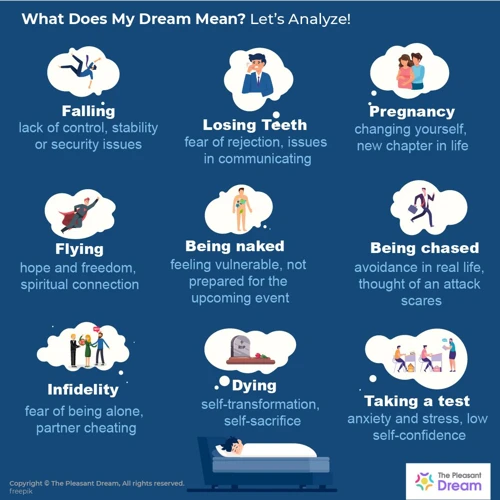Dreams are a mysterious phenomenon that have intrigued humans for centuries. We’ve all experienced the enigmatic world that unfolds in our minds as we sleep, but what is the true meaning behind these subconscious adventures? Unlocking the secrets of our dreams can offer profound insights into our emotions, creativity, and spirituality. In this comprehensive guide, we will delve into the depths of the dreaming mind, exploring the purpose of dreams, different types of dreams, common dream symbols and interpretations, tools for analyzing dreams, and the role of spirituality in dream interpretation. Prepare to embark on a journey of self-discovery and uncover the hidden messages that lie within your dreams.
The Purpose of Dreams

Dreams serve a multitude of purposes, acting as a window into our subconscious mind and offering valuable insights into our emotions, thoughts, and experiences. One of their functions is unconscious processing and emotional regulation. When we dream, our mind processes and integrates information from daily experiences, helping us make sense of our emotions and experiences. Through dreams, we can also engage in problem-solving and creativity. Many breakthroughs and innovative ideas have been attributed to dreams, as they provide a platform for the mind to explore new possibilities and make connections that may be elusive during waking hours. Additionally, dreams can provide spiritual and transcendent experiences. They can act as a portal to the subconscious and higher realms of consciousness, allowing us to connect with our spiritual self and receive divine guidance and messages. By understanding the purpose behind our dreams, we can unlock the hidden meanings and harness their potential for personal growth and enlightenment. However, it’s important to note that dream interpretations can vary, and context and personal associations play a crucial role in uncovering their true significance.
1. Unconscious Processing and Emotional Regulation
Dreams play a crucial role in our unconscious processing and emotional regulation. While we sleep, our mind processes and integrates information from our daily experiences, allowing us to make sense of our emotions and experiences. Dreams provide a safe space where we can explore and process our deepest fears, desires, and unresolved emotions. They offer a platform for our subconscious mind to work through unresolved conflicts, heal emotional wounds, and gain a deeper understanding of ourselves. Through dreams, we can confront and release repressed feelings, leading to emotional healing and growth. If you’ve ever wondered what it means when you dream about a person, it could be an indication of unresolved emotions or a desire to reconnect. Dreams about people can offer valuable insights into the nature of our relationships and the emotions associated with them. So, pay attention to the individuals who appear in your dreams, as they may hold symbolic significance or represent aspects of yourself or your lived experiences.
2. Problem-Solving and Creativity
Dreams have long been associated with aiding problem-solving and enhancing creativity. When we dream, our mind enters a state of relaxation, allowing us to explore new perspectives and make connections that may not be apparent in our waking life. In this state, our subconscious mind can work through complex issues and offer innovative solutions. Many inventors, artists, and scientists have credited their dreams for breakthrough ideas and inspiration. For example, the renowned chemist August Kekulé discovered the structure of the benzene molecule through a dream where he saw a snake biting its own tail, symbolizing the circular structure of benzene. Through dreams, we can tap into a wellspring of creativity and unlock the hidden potential of our minds. Dreams about specific people can also provide valuable insights about our relationships and emotions, further aiding in problem-solving and personal growth.
3. Spiritual and Transcendent Experiences
Spiritual and transcendent experiences in dreams open a doorway to a realm beyond the physical and tangible. These dreams can provide a deep sense of connection to something greater than ourselves, whether it be a divine presence, the collective unconscious, or even glimpses of past lives and spiritual realms. In such dreams, we may receive divine messages and guidance that offer profound insights and direction in our waking lives. They can also facilitate profound spiritual growth and transformation. While the interpretation of these dreams can be subjective and personal, their impact on our spiritual journey can be significant. Exploring and reflecting on these experiences can help us gain a deeper understanding of our place in the universe and foster a greater sense of purpose and meaning in life.
Types of Dreams

Dreams come in various forms, each with its own unique characteristics and significance. One type of dream is lucid dreams. In these dreams, the dreamer becomes aware that they are dreaming and can sometimes exert control over the dream’s narrative and environment. Lucid dreams offer an exciting opportunity for self-exploration and experimentation within the dream world. Another type of dream is nightmares, which can be intensely vivid and anxiety-inducing experiences. Nightmares often stem from the subconscious mind processing fears, anxieties, or traumatic events. They can be distressing but can also serve as a catalyst for personal growth and understanding. Recurring dreams are another intriguing type, characterized by recurring themes, settings, or situations. These dreams may hold significant messages or unresolved issues that need attention. Exploring the patterns and symbols within recurring dreams can offer valuable insights into one’s subconscious mind. Dreams are highly personal experiences, and identifying the type of dream you are having can aid in understanding the underlying meaning and messages they convey.
1. Lucid Dreams
Lucid dreams are a fascinating phenomenon where the dreamer becomes aware that they are dreaming while still in the dream state. In a lucid dream, the dreamer has a heightened sense of consciousness and can actively participate in and manipulate the dream narrative. This experience can be exhilarating and empowering, as individuals have the ability to control their dreams and explore their desires and fantasies to the fullest extent. Lucid dreaming is often accompanied by a sense of freedom and self-awareness, allowing individuals to engage with their dream world in ways that may not be possible in waking life. While lucid dreams can occur spontaneously, there are also techniques and practices that can be used to induce lucid dreaming, such as reality checks, keeping a dream journal, and practicing mindfulness. If you are interested in exploring the world of lucid dreaming, check out our article on how to have lucid dreams and learn techniques to enhance your dream experiences.
2. Nightmares
Nightmares are intense, distressing dreams that can leave us feeling fearful, anxious, or unsettled upon waking up. These dreams often involve elements of danger, threat, or extreme discomfort. While nightmares may be unpleasant, they serve an important purpose in our dream world. They can act as a cathartic release, allowing us to process and confront our fears and anxieties in a safe environment. Nightmares can also serve as warning signs, alerting us to potential dangers or unresolved emotional issues in our waking life. By exploring and analyzing the symbols and themes within nightmares, we can gain valuable insights into our subconscious fears and learn to address and overcome them. If you have recently experienced a nightmare about losing a purse, it may indicate feelings of insecurity, loss, or a fear of losing something valuable or important to you.
3. Recurring Dreams
Recurring dreams are a fascinating phenomenon that can hold significant meaning and insight into our subconscious mind. These are dreams that repeat themselves with similar themes, settings, or characters, often leaving us with a sense of déjà vu. Recurring dreams can indicate unresolved issues or emotions that we have yet to address in our waking life. They may serve as a reminder to pay attention to certain aspects of our lives or to confront recurring patterns or behaviors. Exploring the symbolism and patterns within these dreams can offer valuable clues to understanding ourselves on a deeper level. Whether it’s a recurring dream about losing a purse, which may symbolize feelings of insecurity or loss, or any other recurring theme, paying attention to these dreams can provide valuable insights into our emotions and experiences, ultimately aiding in personal growth and self-awareness.
Common Dream Symbols and Interpretations

Dreams are often filled with symbolic imagery that can hold deeper meanings. Understanding common dream symbols and their interpretations can provide valuable insights into our subconscious mind. One common symbol is water, which can represent emotions, purification, or a symbol of change and transformation. Another symbol is flying, which often represents freedom, confidence, and aspirations. Falling in dreams can symbolize a loss of control, feelings of vulnerability, or the fear of failure. Animals in dreams can carry various meanings, depending on the context and the specific animal involved. For example, a dream about a lion may symbolize strength and courage, while a dream about a snake could represent transformation or hidden fears. Death in dreams is rarely literal and often represents the end of a phase or the beginning of something new. Interpreting dream symbols can be subjective, and it’s essential to consider personal associations and the overall context of the dream. By unraveling the symbolism behind our dreams, we can gain valuable insights into our subconscious mind and navigate our waking lives with a deeper understanding of ourselves and our experiences.
1. Water
Water is a common dream symbol that holds various interpretations. It is often associated with emotions, their depth, and fluidity. Dreaming about calm and clear water can symbolize a sense of tranquility, peace, and emotional balance. On the other hand, turbulent or murky water may indicate emotional turmoil or uncertainty in one’s life. Dreams about drowning in water can signify feeling overwhelmed or out of control. Additionally, water can represent rebirth, renewal, and cleansing in dreams, reflecting the desire for transformation or a fresh start. It’s important to consider the specifics of the dream and personal associations to fully interpret the meaning of water in one’s dreams. You can learn more about interpreting dreams of losing belongings like a purse here.
2. Flying
Flying is a common and captivating dream symbol that often evokes a sense of freedom, liberation, and empowerment. It represents the ability to rise above challenges and obstacles, gaining a new perspective on life. When we dream of flying, it can signify a desire for escape or the need to break free from limitations and restrictions. This dream often reflects a sense of confidence, independence, and a desire for personal growth. It can also symbolize the release of emotional burdens or the achievement of goals. However, the interpretation of flying dreams can vary depending on the individual’s personal experiences and associations. Whether it’s soaring through the sky with ease or struggling to stay afloat, flying dreams invite us to explore our own sense of power and potential.
3. Falling
Dreams about falling are a common and intriguing phenomenon. When we dream of falling, it can symbolize a loss of control or fear of failure in our waking life. This dream may reflect a sense of insecurity or anxiety in certain aspects of our lives, such as relationships, careers, or personal goals. It can also represent a need to let go of something that is holding us back. However, it’s essential to consider the context and emotions associated with the dream to gain a more accurate interpretation. For some individuals, falling dreams may indicate a desire for freedom, a willingness to take risks, or a need to trust the process of life. Exploring the personal symbolism and emotions attached to these dreams can provide valuable insights into our subconscious fears and desires.
4. Animals
Animals in dreams often carry symbolic meaning and can provide valuable insights into our subconscious. When we dream about animals, it is important to pay attention to the specific type of animal and the associated emotions or actions. Each animal has its own unique symbolism and interpretations. For example, dreaming about a wolf may represent a connection with primal instincts and a need for independence. On the other hand, dreaming about a bird could symbolize freedom, spirituality, or the desire to soar above life’s challenges. Animals can also reflect our inner qualities or characteristics. We might dream about a loyal dog as a reflection of our own faithful nature, or a cunning fox as a representation of our wit and resourcefulness. Exploring the symbolism of animals in dreams can provide valuable insights into our own psyche and guide us on our personal journey of self-discovery and growth.
5. Death
Dreams about death can be unsettling and often leave us wondering about their meaning. While dreaming about death can evoke fear and anxiety, it is important to understand that these dreams usually symbolize the end of one phase of life and the beginning of another. In dream symbolism, death can represent change, transformation, and the need to let go of the past. It may signify the end of certain aspects of your life or the shedding of old beliefs, habits, or relationships. Alternatively, dreams about death can also reflect our anxieties about mortality and the fear of losing loved ones. It is essential to consider the emotions and context of the dream to gain a deeper understanding of its interpretation. Remember, dreaming about death does not necessarily predict physical death but rather invites us to embrace new beginnings and growth in our waking lives.
Tools for Analyzing Dreams

Analyzing dreams can be a fascinating journey of self-discovery and understanding. Fortunately, there are various tools available to help unravel the mysteries hidden within our dreams. One of the most effective tools is keeping a dream journal. By recording our dreams immediately upon waking, we capture the vivid details and emotions that often fade from memory as the day progresses. This journal becomes a valuable resource for identifying patterns, recurring symbols, and themes that may hold significance. In addition to dream journals, there are dream analysis techniques that can be employed. These techniques range from Freudian analysis to more modern approaches like Jungian or Gestalt therapy, which delve deeper into the symbolic meanings of dreams. Seeking guidance from experts, such as psychologists or dream interpreters, can also provide valuable insights. Their expertise and experience can shed light on the symbolism and underlying messages in our dreams that we may have overlooked. Armed with these tools, we can embark on a journey of self-reflection and awareness as we decipher the messages concealed within our dreamscapes.
1. Dream Journals
Keeping a dream journal is a powerful tool for unlocking the hidden meanings and symbols within our dreams. Dream journals serve as a written record of our dreams, capturing the details and emotions that can easily fade from memory upon waking. By consistently recording our dreams in a journal, we can develop a deeper awareness of recurring themes, symbols, and patterns that may emerge. This practice also allows us to reflect on our dreams over time, identifying connections and gaining insights into our subconscious mind. Additionally, writing in a dream journal can enhance our dream recall, helping us remember more vivid and detailed dreams. It is recommended to keep a journal close to our bed, ready to capture the essence of our dreams as soon as we wake up.
2. Dream Analysis Techniques
Dream analysis techniques provide valuable tools for deciphering the hidden messages and symbolism within our dreams. One such technique is keeping a dream journal where you record your dreams immediately upon waking up. This helps capture the vivid details and emotions while they are still fresh in your mind. Another effective technique is actively participating in dream analysis through self-reflection and interpretation. By reflecting on the themes, symbols, and emotions in your dreams, you can gain deeper insights into their meaning and significance. Additionally, incorporating techniques such as visualization, meditation, and free association can help unravel the complex layers of your dream content. Seeking guidance from experts, such as psychologists or dream therapists, can also provide valuable perspectives and interpretations, offering a more comprehensive understanding of your dreams. Experimenting with different dream analysis techniques allows you to unlock the true power of your dreams and tap into their wisdom and guidance.
3. Seeking Guidance from Experts
Seeking guidance from experts can be a valuable approach when it comes to interpreting dreams. Sometimes, deciphering the meaning behind our dreams can be challenging, especially if they contain complex symbolism or unfamiliar elements. In such cases, reaching out to professionals who specialize in dream analysis or psychology can provide valuable insights and a fresh perspective. These experts can help navigate the intricacies of dream symbolism, provide interpretations based on their knowledge and experience, and offer guidance on how to apply the insights gained from dreams to our waking lives. Whether it’s through one-on-one consultations, workshops, or online resources, seeking guidance from experts can enhance our understanding of our dreams and contribute to our personal growth and self-discovery.
Interpreting Personal Symbolism

When it comes to interpreting dreams, personal symbolism holds great importance. Each individual has unique associations and meanings attached to specific symbols that appear in their dreams. To interpret personal symbolism, it is crucial to understand your feelings and emotions within the dream. Pay attention to how certain symbols make you feel and what emotions they evoke. Additionally, identifying recurring themes in your dreams can provide valuable insights into underlying patterns and concerns in your life. Make note of any significant symbols or themes that appear repeatedly, as they may hold deeper meaning. Exploring personal associations with symbols is also essential. Reflect on your personal experiences, memories, and cultural background to gain a deeper understanding of the symbolism in your dreams. Creating a dream journal or using dream analysis techniques can help you track recurring symbols and their meanings, assisting in the interpretation of your dreams on a more personal level.
1. Understanding Your Feelings and Emotions
To truly interpret the meaning of your dreams, it is essential to focus on the emotions and feelings experienced during the dream. Emotions are powerful indicators that can provide valuable insights into our subconscious desires, fears, and unresolved issues. When analyzing your dreams, pay close attention to the emotional landscape. Ask yourself, “What emotions did I feel during the dream?” and “How did those emotions affect me?” Were you overwhelmed with fear, sadness, or joy? Did you feel a sense of calm or unease? Understanding the underlying emotions can help decipher the message your dream is trying to convey. By acknowledging and exploring these emotions, you can gain a deeper understanding of yourself and unlock the significance of your dreams.
2. Identifying Recurring Themes
Identifying recurring themes in our dreams is a key aspect of dream analysis. These recurring themes may manifest as symbols, situations, or emotions that consistently appear in our dreams over time. By recognizing and identifying these patterns, we can gain deeper insights into our unconscious mind and uncover hidden messages. Paying attention to common themes in our dreams can provide valuable information about our fears, desires, and unresolved issues. It allows us to see connections and recurring patterns in our waking life that we may not have been aware of. Whether it’s a recurring dream about flying, being chased, or losing something important, exploring the significance of these themes can lead to a greater understanding of ourselves and the underlying aspects of our lives that may need attention.
3. Exploring Personal Associations
When it comes to exploring personal associations in dream interpretation, there are several key strategies that can be employed. One effective approach is to examine the emotions and feelings evoked by specific dream symbols. By reflecting on how these symbols make you feel, you can gain insight into their personal significance and meaning. Another method is identifying recurring themes or symbols in your dreams. These recurring elements often carry deeper significance and can provide a glimpse into subconscious patterns or unresolved issues. Lastly, exploring personal associations also involves delving into your own experiences, memories, and beliefs. By examining the connections between your waking life and dream symbols, you can gain a deeper understanding of the messages your dreams may be conveying. Remember, dream analysis is highly personal, and by carefully considering your own unique associations, you can uncover profound insights into the meaning behind your dreams.
The Role of Spirituality in Dream Interpretation

Spirituality plays a significant role in the interpretation of dreams, providing a deeper understanding of their meaning and implications. One aspect of the role of spirituality in dream interpretation is connecting with the collective unconscious. According to the renowned psychologist Carl Jung, dreams are a reflection of the collective unconscious – a shared reservoir of universal symbols and archetypes. Through dream analysis, individuals can tap into this collective wisdom, gaining insights into the collective human experiences and the deeper aspects of their own psyche. Additionally, dreams can serve as a means of receiving divine messages and guidance. Many religious and spiritual traditions believe that dreams are a channel through which divine beings communicate with individuals, offering guidance, warnings, or reassurance. By paying attention to the symbolism and narratives within their dreams, individuals can decipher these messages and apply them to their waking lives. Another aspect of the role of spirituality in dream interpretation is the exploration of past lives and spiritual realms. Some spiritual practices and belief systems hold that dreams can provide glimpses into past lives, allowing individuals to gain insights into their karmic patterns and soul’s journey. Dreams can be seen as a pathway to accessing spiritual realms beyond conventional reality, expanding one’s consciousness and connecting with higher realms of existence. Incorporating spirituality into dream interpretation opens up a realm of possibilities, enriching the understanding and significance of our dreams and their impact on our spiritual growth and connection to the divine.
1. Connecting with the Collective Unconscious
Connecting with the collective unconscious is a fascinating aspect of dream interpretation. The collective unconscious, as proposed by Carl Jung, refers to the shared reservoir of knowledge and experiences that all humans inherit. In dreams, we may encounter symbols and archetypes that are collective in nature, representing universal themes and patterns. These symbols can provide insights into the deeper aspects of our psyche and allow us to tap into the wisdom of humanity as a whole. Exploring the collective unconscious in dream analysis can bring about a sense of connection to something larger than ourselves and offer profound insights into our place in the world.
2. Receiving Divine Messages and Guidance
Receiving divine messages and guidance is a mystical aspect of dream interpretation. Dreams have long been considered a channel for communication between individuals and higher powers. In this realm of dreaming, divine messages are believed to be transmitted, providing insight into important aspects of one’s life or offering guidance on various matters. These messages can come in many forms, such as symbols, visions, or even direct communication with spiritual entities. Interpreting these divine messages requires a deep understanding of personal symbolism and spiritual beliefs, as what may hold significance for one person may be entirely different for another. Embracing the spiritual dimension of dreams can lead to profound self-discovery and a deeper connection to the divine.
3. Exploring Past Lives and Spiritual Realms
When it comes to the realm of dreams, one fascinating aspect is the ability to explore past lives and spiritual realms. Through our dreams, we may have vivid experiences that seem to transcend time, connecting us to our previous incarnations or alternative realities. This concept is rooted in the belief of reincarnation and the existence of parallel dimensions. During these dreams, individuals may encounter scenes, people, or situations that resonate with a different place and time, triggering a sense of familiarity or déjà vu link1. Exploring past lives and spiritual realms in dreams can provide profound insights into our soul’s journey and offer guidance on our current life path. By keeping a dream journal and analyzing recurring symbols or themes, one can delve deeper into these experiences and potentially uncover deeper truths about the nature of existence and the interconnectedness of all things.
Applying Dream Insight to Daily Life
Once we have gained insights into the meaning behind our dreams, it is crucial to apply this newfound wisdom to our daily lives. Dream insight can be a powerful tool for self-reflection and personal growth. By analyzing the symbols, emotions, and themes within our dreams, we can gain a deeper understanding of our own desires, fears, and aspirations. This self-reflection allows us to make conscious choices and align our actions with our true selves. Dreams can aid in problem-solving and decision making. When faced with challenges or dilemmas, we can seek guidance from our dreams and tap into the innate wisdom of our subconscious mind. Dreams can offer alternative perspectives, creative solutions, and valuable insights that may not be immediately apparent in our waking state. Dreams have the potential to enhance creativity and intuition. They can unlock our imagination and stimulate innovative ideas and approaches. By paying attention to our dreams and incorporating their messages into our daily lives, we can harness their transformative power and lead a more fulfilling and purposeful existence.
1. Self-Reflection and Personal Growth
Self-reflection and personal growth are essential aspects of exploring the insights and lessons gained from our dreams. Self-reflection involves examining our thoughts, emotions, and behaviors as they are revealed in our dreams. By analyzing the patterns and themes that emerge, we can gain a deeper understanding of ourselves and our subconscious desires. This process allows us to identify areas for personal growth and transformation. Through the interpretation of dreams, we can uncover unresolved conflicts, hidden fears, and unexpressed desires that may be holding us back in waking life. Personal growth is achieved by applying these insights to our daily lives, making positive changes, and embracing new opportunities for self-improvement. By nurturing self-awareness and continuously working towards personal growth, we can enhance our overall well-being and live a more fulfilling and purposeful life.
2. Problem-Solving and Decision Making
In the realm of dreams, one fascinating aspect is their ability to aid in problem-solving and decision making. Within the dream state, our minds are free to explore unconventional solutions and consider a range of possibilities without the limitations of logic or external constraints. Dreams can present us with alternative perspectives, innovative approaches, and fresh insights that may not have occurred to us in our waking life. By analyzing and reflecting on the symbols and narratives within our dreams, we can tap into this wellspring of creative problem-solving and use it to inform our real-life decision making. Whether it’s resolving a personal dilemma or finding solutions to complex professional challenges, our dreams can serve as a valuable resource for gaining clarity and inspiration. It is essential to pay attention to the messages and symbols that arise during dreams and extract lessons that can be applied to waking life.
3. Enhancing Creativity and Intuition
Enhancing creativity and intuition is another significant aspect of applying dream insight to daily life. Dreams have the ability to stimulate our creative thinking, allowing us to tap into new ideas and perspectives. Through dream analysis, we can uncover symbolism and imagery that can inspire artistic endeavors, problem-solving, and out-of-the-box thinking. Additionally, dreams can enhance our intuition, providing insights and guidance that may be hidden within our subconscious mind. By paying attention to the intuitive messages contained in our dreams, we can make more informed decisions and trust our gut instincts. Embracing the creative and intuitive aspects of our dream life can bring about a deeper level of self-expression and understanding in our waking lives, ultimately leading to personal growth and fulfillment.
Conclusion
In , dreams hold a significant place in our lives, offering a glimpse into the depths of our subconscious mind. They serve various purposes, including unconscious processing and emotional regulation, problem-solving and creativity, and spiritual and transcendent experiences. By analyzing and interpreting our dreams, we can gain valuable insights into ourselves and our life journey. Whether it’s through keeping a dream journal, seeking guidance from experts, or exploring personal symbolism, we can tap into the hidden messages and meanings behind our dreams. Applying the insights gained from our dreams to our daily lives allows for self-reflection, personal growth, problem-solving, and enhancing creativity. Dreams are a bridge between the conscious and unconscious realms, and by unraveling their mysteries, we can unlock the true potential of our dreaming mind. So, embrace your dreams, explore their depths, and allow them to guide you on a path of self-discovery and enlightenment.
Frequently Asked Questions
1. Can dreams predict the future?
While some people believe that dreams can provide glimpses into future events, there is no scientific evidence to support the idea that dreams can predict the future. Dreams are more commonly seen as reflections of our unconscious thoughts, emotions, and experiences.
2. Why do we forget our dreams?
Forgetting dreams is quite common due to the brain’s natural process of filtering and prioritizing information. Dreams are stored in our short-term memory, and if they are not consolidated into long-term memory quickly, they may be forgotten upon waking.
3. What causes nightmares?
Nightmares can be caused by a variety of factors, including stress, anxiety, trauma, medications, and sleep disorders. They often reflect our fears and unresolved emotional issues, serving as a way for our mind to process and cope with these intense emotions.
4. Can I control my dreams?
Yes, it is possible to control your dreams through a practice called lucid dreaming. Lucid dreaming is the awareness that you are dreaming while still in the dream state, allowing you to consciously influence and manipulate the dream narrative.
5. How can I remember my dreams better?
Keeping a dream journal by your bedside can help improve dream recall. Immediately upon waking, jot down any details you can remember from your dream. This practice can train your brain to pay closer attention to your dreams and improve your ability to remember them.
6. What does it mean if I dream about someone specific?
Dreams about specific individuals can hold personal significance. The interpretation can vary depending on the nature of your relationship with that person and the emotions or experiences associated with them. It’s important to consider the context and personal associations to uncover the meaning.
7. Why do some dreams feel so real?
During REM (Rapid Eye Movement) sleep, which is when most vivid dreams occur, the brain becomes highly active, and sensory areas are activated. This can result in dreams that feel incredibly real, as if we are experiencing actual sensations and events.
8. Do animals dream?
Research suggests that animals, especially mammals, also experience REM sleep, which is associated with dreaming. While we cannot definitively know the content of their dreams, observations of animal behavior during sleep suggest that they may indeed dream.
9. What is the significance of recurring dreams?
Recurring dreams often indicate that there are unresolved issues or emotions that need attention in your waking life. They may serve as a signal to pay closer attention to certain aspects of your life and address any underlying concerns or feelings.
10. Are there universal dream symbols?
While certain dream symbols may have common interpretations, such as water symbolizing emotions or flying symbolizing freedom, dream symbolism can also be highly personal. Symbols in dreams are often influenced by an individual’s unique experiences, associations, and cultural background.







